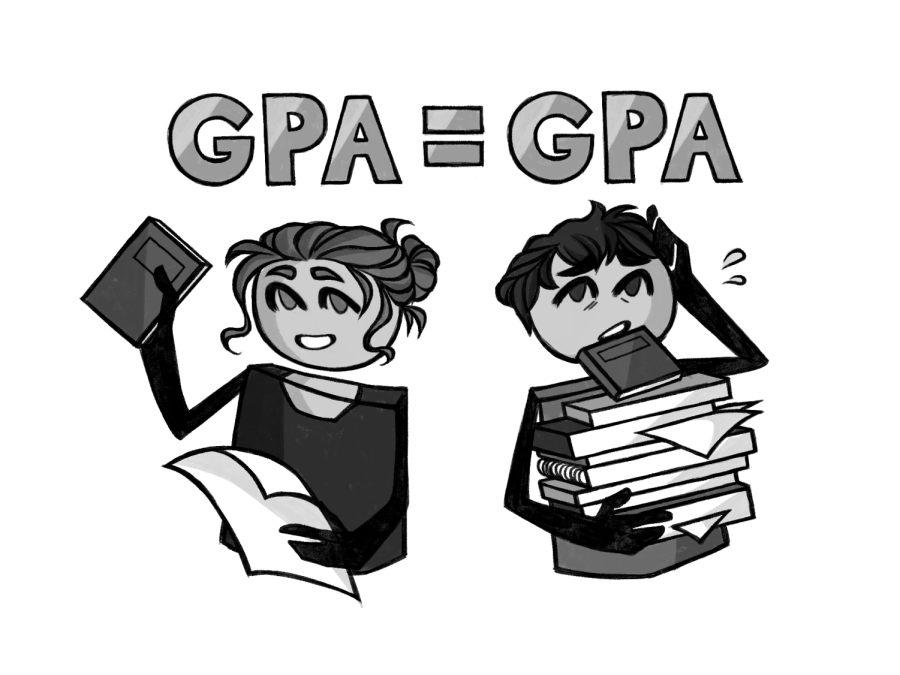CAMPUS: More work, same grade point average
Students discuss the limits placed on GPA weight for advanced courses
SCHS underclassmen can take as many honors and Advanced Placement courses available to them, but some classes offered to exclusively freshmen and sophomores do not count toward weight on their GPA.
Freshman Didem Tokuz believes that she would benefit from receiving a weighted GPA because it would give her more satisfaction from putting in the effort to do well in challenging classes.
“I don’t think the limit is really necessary. I don’t know why they put it like that,” Tokuz said. “If I’m doing the work, I think it should be allowed to boost my GPA.”
Similarly, junior Aayush Sugali was surprised by the weighted GPA limits and concerned by the reasoning behind it.
“What’s the point of taking honors as opposed to a regular class? I wish there was an extra boost that is offered,” Sugali said.
Contrarily, senior Aleena Bosky did not care much for the GPA boost limits as an underclassman.
“It (life) is not about high school, and people make it seem like it is. They make it seem like high school is the end-all be-all, and if you just don’t take APs or don’t have an honors class, you are going to fail and no college is going to want you,” Bosky said. “But that’s not what colleges are looking for.”
However, Tokuz is scared her unweighted GPA may put her behind other college applicants from schools who allow underclassmen honors courses to receive a GPA boost.
“I feel like when they (colleges) first look at our transcripts, they’re going to see that our GPA isn’t as high as the other students,” Tokuz said. “I feel like it’s going to affect me when I apply for colleges.”
Academic counselor Victoria Aguaristi believes that the GPA boost limit is deceiving and is pointless when applying to popular in-state colleges.
“There is really no reason to keep boosting GPAs when UCs and CSUs have a cap,” Aguaristi said. “On the transcript, the title reflects a challenging course. However, there is no added bonus, or, simply, the curriculum is the bonus.”
Bosky explained how instead of preventing her from taking rigorous classes, the GPA boost limit enabled her to take classes that helped her find a field of passion.
“Even though I could have taken AP Biology or AP Chemistry, I took Human Physiology Honors and Introduction to Biotechnology,” Bosky said. “Honestly, taking Introduction to Biotechnology was probably one of the best decisions I’ve ever made.”
Aguaristi shares this sentiment and wishes more students would look past the GPA weight.
“I hope they would choose the class that is of interest and not simply because either their community, their family or their own peer pressure is telling them that they need to have this to get to college because I don’t think that’s true,” Aguaristi said. “I think you can have just regular A-G (courses), do amazing in them, and you can still have an equal shot at getting into Ivy Leagues as any other person.”
Tokuz, however, sees the GPA boost limit as a restraint on students who hope to exceed academically.
“I definitely feel like there shouldn’t be any limits. I think freshmen and sophomores should be able to take more AP classes than is offered because you want to be able to get as high a GPA as possible,” Tokuz said.
Sugali feels the limit on a weighted GPA negatively impacted his workload.
“As a sophomore, I thought I was mature enough to take more than two APs. Doing that would lead to a less stressful junior year. We all know junior year is the most important to colleges,” Sugali said. “I wish the limit didn’t exist so that I could take three APs this year and three last year instead of two (last year) and four (this year).”
Adversely, the transition between sophomore and junior year’s workload helped Bosky sustain a healthy lifestyle.
“I’d say it was a good thing to have that transition because I knew how much stress I could put on myself because every year I would add more to my workload,” Bosky said. “Eventually, I found a point where I could do no more. You need to maintain that point even in high school and college, or you will physically explode.”
Bosky believes that taking classes with the intention of becoming a balanced student instead of simply receiving a higher GPA is more beneficial in the long run.
“If you take the time to actually get to know yourself and get to know what you want to do, you end up becoming a more well-rounded student, and your GPA will reflect that,” Bosky said.


